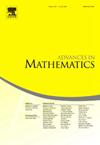混合霍奇模块和实群
IF 1.5
1区 数学
Q1 MATHEMATICS
引用次数: 0
摘要
设G为复约群,θ:G→G→对合,K=Gθ。1996年,W. Schmid和第二位作者提出了一个方案,利用G的旗变及其极化上的k -等变扭曲混合Hodge模研究对应实形式GR的幺正表示。在本文中,我们为实现该计划迈出了重要的第一步。我们的第一个主要结果给出了用Lusztig-Vogan多项式表示的标准模的组合级数中出现的Hodge数的显式组合公式。我们的第二个主要结果是Jantzen猜想的极化版本,说明构成因子上的Jantzen形式是底层Hodge模块的极化。我们的第三个主要结果表明,对于常规的Beilinson-Bernstein数据,一个不可约的Harish-Chandra模的最小k型位于相应的Hodge模的Hodge过滤的最低部分。我们的结果的一个直接结果是对[2]的签名多重性公式的霍奇理论证明,这是这项工作的灵感。本文章由计算机程序翻译,如有差异,请以英文原文为准。
Mixed Hodge modules and real groups
Let G be a complex reductive group, an involution, and . In [29], W. Schmid and the second named author proposed a program to study unitary representations of the corresponding real form using K-equivariant twisted mixed Hodge modules on the flag variety of G and their polarizations. In this paper, we make the first significant steps towards implementing this program. Our first main result gives an explicit combinatorial formula for the Hodge numbers appearing in the composition series of a standard module in terms of the Lusztig-Vogan polynomials. Our second main result is a polarized version of the Jantzen conjecture, stating that the Jantzen forms on the composition factors are polarizations of the underlying Hodge modules. Our third main result states that, for regular Beilinson-Bernstein data, the minimal K-types of an irreducible Harish-Chandra module lie in the lowest piece of the Hodge filtration of the corresponding Hodge module. An immediate consequence of our results is a Hodge-theoretic proof of the signature multiplicity formula of [2], which was the inspiration for this work.
求助全文
通过发布文献求助,成功后即可免费获取论文全文。
去求助
来源期刊

Advances in Mathematics
数学-数学
CiteScore
2.80
自引率
5.90%
发文量
497
审稿时长
7.5 months
期刊介绍:
Emphasizing contributions that represent significant advances in all areas of pure mathematics, Advances in Mathematics provides research mathematicians with an effective medium for communicating important recent developments in their areas of specialization to colleagues and to scientists in related disciplines.
 求助内容:
求助内容: 应助结果提醒方式:
应助结果提醒方式:


